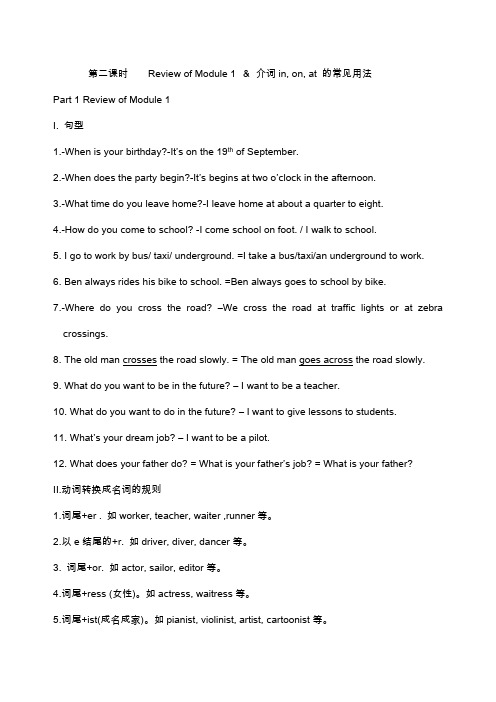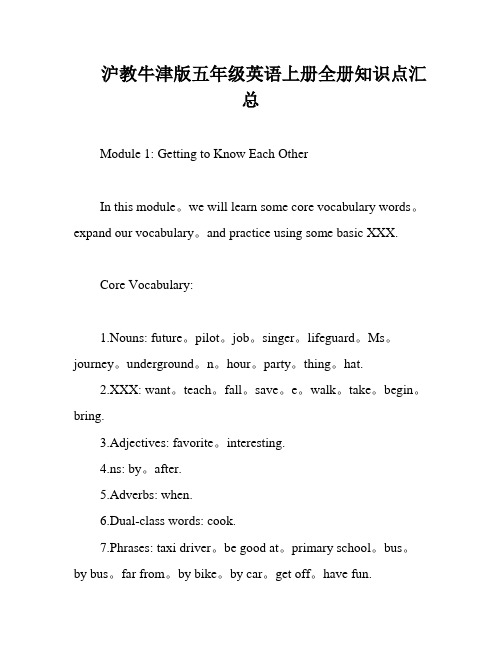上海小学五年级第一学期英语介词
- 格式:doc
- 大小:19.00 KB
- 文档页数:3

M1U1第2页get to know you 了解你an ‘orange’ party 一个橘色派对come to my birthday party 来参加我的生日聚会on Sunday 在周日on the ninth of September = on September the ninth 在九月九号at two o’clock in the afternoon = at 2:00 p.m. 在下午两点bring or wear some orange things to the party 带或穿一些橘黄色的东西来参加聚会my favourite colour 我最喜欢的的颜色be moved 很感动的That sounds interesting/ funny. 听起来很有趣/滑稽。
I can’t wait. 我等不及了。
give sb a big surprise 给某人一个惊喜be surprised 很惊讶的第3页1. 单词:一月到十二月in January, February, March, April, May, June, July, August, September, October, November, December2. 序数词:第一到第三十一见书序数词前+the 例如:the first第4页at Peter’s birthday party 在Peter的生日聚会上 a pair of orange trousers 一条橘色裤子a picture of you /him/her 一张你的图片make your own(invitaion) 做你的请柬have some fun = have a good time = enjoy ourselves 玩得开心make a birthday invitation 做一张生日请柬invite sb to the party 邀请某人去聚会live in Room 301 住在301室live on Yongqing Road 住在永清路live at Room 301, Building 9, 58 Yongqing Road 住在永清路58号9号楼301室近义词(同义词):begin – start interesting – funny present – gift复数:party – parties Sunday – Sundays第5页Tommy’s birthday present Tommy的生日礼物be busy doing sth. 忙于做某事the next morning 第二天早上 a smart new hat 一顶漂亮的新帽子a hat maker 一个做帽子的人be tired of sweets 厌倦糖果be late for school 上学迟到反义词:come – go bring – take interesting – boring busy – free sad – happy late – early next – last new – old easy – hard / difficult第6页drill 钻孔least 最少at least 至少leave 离开leave home 离开家last but not least 最后但也是最重要的(用于作文最后一段)句型1. When does the first class begin? It begins at 8:30.(begin 是动词,不要与is连用,三单动词加“s”。

沪教版五上英语单元知识汇总以下是沪教版五年级上册英语各单元的知识汇总:Unit 1 My Future单词:•future(将来,未来)•want(想要)•pilot(飞行员)•teach(教)•cook(厨师,烹饪)•taxi driver(出租车司机)•job(工作)•singer(歌手)•fall/drop(掉落)•lifeguard(救生员)•save(救助,节约)•become(变成,变得)•短语:••fly a plane(驾驶飞机)•in the sky(在空中)•help people(帮助人们)•teach English(教英语)•in a school(在一所学校)•cook nice/delicious food(做美味的食物)•be afraid of+动词ing(害怕……)•be good at+动词ing(擅长……)•fall/jump into the lake(掉入/跳入湖中)•want to+动词原形(想要做某事)•句型:••What do you want to be? I want to be a/an+职业.•What does he/she want to be? He/She wants to be a/an+职业.•Do you want to be a/an+职业? Yes, I do./No, I don’t.•Does he/she want to be a/an+职业? Yes, he/she does. No, he/she doesn’t.Unit 2 Going to School•单词:••by(表示方式)•walk(步行)•Ms(女士)•journey(旅程)•primary school(小学)•underground(地铁)•station(车站)•take(乘坐,带领)•after(在……之后)•hour(小时)•短语:••by bus(乘公交车)•by car(乘小汽车)•by bike(骑车)•on foot(步行)•far from(离……远)•walk to school(步行去学校)•journey to work(上班旅程)•at Happy Primary School(在开心小学)•on Green Street(在格林大街)•an underground station(一个地铁站)•take the train(乘火车)•get off the train(下火车)•at Park Street Station(在公园街站)•take Bus No.12(乘12路公交)•at Spring Street Bus Stop(在春街公交站)•after an hour(在一小时后)•句型:••How do you come to school? I come to school+介词短语. •How does he/she go to school? He/She goes to school+介词短语.•I live far from/near school.Unit 3 My Birthday•••party(聚会)•when(什么时候)•begin(开始)•bring(带来)•thing(东西,事物)•favourite(最喜欢的)•interesting(有趣的)•hat(帽子)•短语:••birthday party(生日聚会)•some orange things(一些橙色东西)•an orange party(一次橙色聚会)•That sounds interesting.(那听起来很有趣)•I can’t wait!(我等不及了)•Happy birthday!(生日快乐)•••Can you come to my birthday party? Sure.•When’s your birthday? It’s on+具体日期.•What time does the party begin? It begins at+具体时间.。

第二课时Review of Module 1 &介词in, on, at 的常见用法Part 1 Review of Module 1I. 句型1.-When is your birthday?-It’s on the 19th of September.2.-When does the party begin?-It’s begins at two o’clock in the afternoon.3.-What time do you leave home?-I leave home at about a quarter to eight.4.-How do you come to school? -I come school on foot. / I walk to school.5. I go to work by bus/ taxi/ underground. =I take a bus/taxi/an underground to work.6. Ben always rides his bike to school. =Ben always goes to school by bike.7.-Where do you cross the road? –We cross the road at traffic lights or at zebra crossings.8. The old man crosses the road slowly. = The old man goes across the road slowly.9. What do you want to be in the future? – I want to be a teacher.10. What do you want to do in the future? – I want to give lessons to students.11. What’s your dream job? – I want to be a pilot.12. What does your father do? = What is your father’s job? = What is your father?II.动词转换成名词的规则1.词尾+er . 如worker, teacher, waiter ,runner等。


上海牛津英语五年级上册语法点整理1. 名词- 名词是用来表示人、事物、地方或抽象概念的词语。
- 名词有可数名词和不可数名词之分。
- 可数名词可以用来表示一个或多个,可以用a/an修饰。
- 不可数名词表示一种物质、一种抽象概念等,不能用a/an修饰,也没有复数形式。
2. 代词- 代词是用来代替名词的词语。
- 代词分为人称代词、物主代词、反身代词、指示代词、疑问代词、不定代词等种类。
- 代词可以用来替代特定的人或事物,使句子更加简洁清晰。
3. 形容词- 形容词用来修饰名词或代词,表示人或事物的性质、状态、特点等。
- 形容词通常放在名词或代词的前面。
- 形容词有原级、比较级和最高级之分,用来表示程度或比较。
4. 动词- 动词用来表示一个人或事物的动作、状态、存在等。
- 动词分为及物动词和不及物动词。
- 及物动词需要接宾语,不及物动词不需要接宾语。
- 动词的时态有过去时、现在时和将来时等。
5. 副词- 副词用来修饰动词、形容词、副词或整个句子,表示时间、地点、程度等。
- 副词通常放在要修饰的词语之前或之后。
6. 介词- 介词用来表示人或事物之间的关系。
- 介词通常与名词或代词连用,构成介词短语。
- 常见的介词有in、on、at、under等。
7. 冠词- 冠词用来表示名词的特指与泛指。
- 英语中的冠词分为定冠词和不定冠词。
- 定冠词the表示特指,不定冠词a/an表示泛指。
8. 句子- 句子是由主语和谓语构成的完整表达意思的语言单位。
- 句子分为陈述句、疑问句、祈使句和感叹句等种类。
- 句子根据结构可以分为简单句、并列句和复合句。
9. 从句- 从句是句子中的一部分,不能独立成句。
- 从句通常由连词引导,与主句之间存在一定的关系。
- 常见的从句有名词性从句、定语从句和状语从句等。
10. 时态- 时态用来表示动作发生的时间。
- 常见的时态有一般现在时、一般过去时、一般将来时等。
- 时态的使用与句子的主语和谓语的时态有关。

沪教牛津版五年级英语上册全册知识点汇总Module 1: Getting to Know Each OtherIn this module。
we will learn some core vocabulary words。
expand our vocabulary。
and practice using some basic XXX.Core Vocabulary:1.Nouns: future。
pilot。
job。
singer。
lifeguard。
Ms。
journey。
underground。
n。
hour。
party。
thing。
hat.2.XXX: want。
teach。
fall。
save。
e。
walk。
take。
begin。
bring.3.Adjectives: favorite。
interesting.4.ns: by。
after.5.Adverbs: when.6.Dual-class words: cook.7.Phrases: taxi driver。
be good at。
primary school。
bus。
by bus。
far from。
by bike。
by car。
get off。
have fun.XXX Vocabulary:1.Nouns: doctor。
XXX。
sky。
subject.2.Months: January。
February。
March。
April。
May。
June。
July。
August。
September。
October。
XXX。
XXX.3.XXX: help.4.Phrases: fly a plane。
be afraid of.XXX Structures:1."What do you want to be?" - "I want to be a pilot." (Asking XXX.)2."What do you want to be?" - "I want to be a XXX." (Asking XXX.)In this module。
【沪教版】五年级(上册)英语:知识点总结Module 1Getting to know each other一、核心词汇1.名词:future 将来;未来pilot 飞行员job 工作;职业singer 歌手lifeguard 救生员Ms 女士journey旅程;旅行underground地铁station 车站hour 小时party 聚会thing 东西;事物hat 帽子2.动词:want 想要teach 教(课)fall 掉落;落下save 救;救助;节约become 变成;变得walk 走;步行take 乘坐(交通工具);带领begin 开始bring 带来3.形容词:favorite 最喜欢的interesting 有趣的4.介词:by(表示方式);靠近after 在……后5.副词:when 什么时候6.兼类词:cook 厨师;烹饪7.短语:taxi driver 出租车司机(be) good at 擅长primary school 小学bus stop 公共汽车站by bus 乘公共汽车far from 离……远on foot 步行by bike 骑自行车by car 乘小汽车get off 下车have fun 尽情玩二、拓展词汇1.名词:doctor 医生teacher 老师sky 天空subject 科目2.月份名词:January (Jan.) 一月February(Feb.) 二月March(Mar.) 三月April(Apr.) 四月May 五月June(Jun.) 六月July(Jul.)七月August(Aug.) 八月September(Sept.) 九月October(Oct.) 十月November(Nov.) 十一月December(Dec.) 十二月3.动词:help 帮助4.短语:fly a plane 驾驶飞机be afraid of 害怕三、核心句型1.—What do you want to be? 你想要成为什么?—I want to be a pilot. 我想要成为一名飞行员。
五年级上册英语介词表介词概述介词是英语语法中的一部分,常用于连接名词、代词或动词与其他部分的词汇。
在句子中,介词通常用来表达位置、时间、方式、原因等关系。
以下是五年级上册英语中常用的介词及其用法。
位置介词- 在(in)- 用于表示在某个范围、建筑物或地方内- 例如:在学校、在书包里- 在...上(on)- 用于表示物体或表面上的位置- 例如:在桌子上、在墙上- 在...下(under)- 用于表示物体或表面下面的位置- 例如:在椅子下、在桌子下面- 在...旁边(beside)- 用于表示在某物旁边- 例如:在门旁边、在树旁边方式介词- 用(by)- 用于表示通过某种方式或工具- 例如:用手、用车- 用(with)- 用于表示使用某种工具或带有某种特征的事物- 例如:用铅笔、用手机- 通过(through)- 用于表示穿过某个物体或通过某个区域- 例如:通过门、通过森林时间介词- 在...前(before)- 用于表示某个事件或时间点之前- 例如:在午饭前、在星期一前- 在...后(after)- 用于表示某个事件或时间点之后- 例如:在课后、在晚饭后- 在...期间(during)- 用于表示某个时间段内- 例如:在假期期间、在活动期间原因介词- 为了(for)- 用于表示某个目的或目标- 例如:为了研究、为了娱乐- 因为(because of)- 用于表示某个原因或理由- 例如:因为雨、因为生病以上是五年级上册英语常用的介词及其用法。
请同学们多加练,掌握介词在不同语境中的正确使用。
注:此表格仅供参考,具体用法还需根据上下文判断。
五年级方位介词英语一、基础知识方位介词是指用来描述人或物在空间中位置关系的介词。
在英语中,常用的方位介词有:in、on、at、above、below、under、beside 等。
二、使用规则1. in:用于描述物体在某个范围内,表示在某个封闭的空间或区域之内。
- The book is in the drawer.(书在抽屉里。
)- Jane is in the classroom.(简在教室里。
)2. on:用于描述物体在某个表面上,表示在某个平面之上。
- The cup is on the table.(杯子在桌子上。
)- The cat is on the roof.(猫在屋顶上。
)3. at:用于表示具体的位置或地点。
- Tom is at the park.(汤姆在公园。
)- The party is at John's house.(派对在约翰家。
)4. above:用于描述物体在另一个物体或位置之上。
- The bird is flying above the tree.(鸟在树的上方飞翔。
)- The stars are above us.(星星在我们的上方。
)5. below:用于描述物体在另一个物体或位置之下。
- The fish is swimming below the water.(鱼在水下游泳。
)- The ground is below our feet.(地面在我们脚下。
)6. under:用于描述物体在另一个物体的下面,表示在某个物体的底部。
- The cat is hiding under the bed.(猫躲在床下。
)- The ball rolled under the table.(球滚到桌子底下。
)7. beside:用于描述物体在另一个物体的旁边。
- The dog is sitting beside the boy.(狗坐在男孩旁边。
)- The car is parked beside the building.(车停在建筑物旁边。